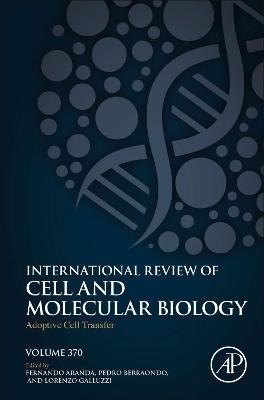
Adoptive Cell Transfer
Academic Press Inc (Verlag)
978-0-323-99399-9 (ISBN)
Fernando Aranda holds a BSc in Biology (2006) and Biochemistry (2007) from the University of Navarra. Then, he specialized in different strategies of Cancer Immunotherapy with a MSc in Biomedical Research (2008), and a PhD Degree (2012) from the University of Navarra (Pamplona) – Cima University of Navarra. More than 12 years in translational research focus on antitumor immune responses and Cancer Immunotherapy. Author of 64 publications indexed in PubMed in prestigious international journals, with h-index 30 and 4,296 cites (October 2022). He completed the Program of Sara Borrell (ISCIII) -competitive Postdoctoral contract- in the Group of Immune Receptors of the Innate and Adaptive System (IDIBAPS), Barcelona (2016-2018). Co-author of 1 invention patent: Composition based on the fibronectin domain A for the treatment of melanoma - WO/2011/101332. In 2012, Fernando Aranda obtained a Scientific Award, "Profesor Durantez" II Edición, for the best scientific article in Tumor Immunology by Fundación LAIR. Recently, Fernando Aranda awarded a competitive Research Fellow contract “Miguel Servet tipo I by Instituto de Salud Carlos III, to continue his independent researcher career (IP) in cancer immunotherapy issues. Specifically, he is involved in Translational Immunotherapy of Peritoneal Carcinomatosis. Currently, Fernando Aranda leads a research group in cooperation with Dr. Pedro Berraondo. Pedro Berraondo graduated in Pharmacy at the University of Navarra in 1999. In 2004 he obtained the Ph.D. at the same university. Next, he worked at the Pasteur Institute in Paris (France) under the supervision of Dr. Claude Leclerc, where he developed novel strategies in tumor immunotherapy within the European THERAVAC project. In February 2007, he joined the Immunology and Immunotherapy Program at the Cima Universidad de Navarra, where he leads the Cytokine-based Immunotherapy laboratory. He is co-inventor of ten patents and he is co-author of more than 140 publications, including publications in Nature, Nature Medicine, Nature Reviews Drug Discovery, Immunity, Cancer Discovery, and Cancer Cell. He was certified as a full professor in 2021 by AQU. He is co-director of the degree of expert in immunooncology at the Faculty of Medicine of the University of Navarra, and is in charge of the undergraduate course of macromolecular structure at the Faculty of Sciences of the University of Navarra. He is also the coordinator of the immuno-oncology work module at CIBERONC. Lorenzo Galluzzi is Assistant Professor of Cell Biology in Radiation Oncology at the Department of Radiation Oncology of the Weill Cornell Medical College, Honorary Assistant Professor Adjunct with the Department of Dermatology of the Yale School of Medicine, Honorary Associate Professor with the Faculty of Medicine of the University of Paris, and Faculty Member with the Graduate School of Biomedical Sciences and Biotechnology of the University of Ferrara, the Graduate School of Pharmacological Sciences of the University of Padova, and the Graduate School of Network Oncology and Precision Medicine of the University of Rome “La Sapienza. Moreover, he is Associate Director of the European Academy for Tumor Immunology and Founding Member of the European Research Institute for Integrated Cellular Pathology. Galluzzi is best known for major experimental and conceptual contributions to the fields of cell death, autophagy, tumor metabolism and tumor immunology. He has published over 450 articles in international peer-reviewed journals and is the Editor-in-Chief of four journals: OncoImmunology (which he co-founded in 2011), International Review of Cell and Molecular Biology, Methods in Cell biology, and Molecular and Cellular Oncology (which he co-founded in 2013). Additionally, he serves as Founding Editor for Microbial Cell and Cell Stress, and Associate Editor for Cell Death and Disease, Pharmacological Research and iScience.
1. Impact of tumor microenvironment on Adoptive Cell Transfer activity Juan Jose Lasarte 2. Dendritic Cell Transfer Oliver Kepp 3. CAR-T Cell dysfunction and exhaustion Angela Aznar 4. NK Cell-based cancer immunotherapy Maite Alvarez 5. Enabling CAR-T cells for solid tumors: rage against the suppressive tumor microenvironment Asís Palazon 6. Improving Adoptive T-Cell therapy with cytokines administration Jonathan Pol 7. What will (and should) be improved in Immunotherapy with CAR? M Juan
| Erscheinungsdatum | 15.07.2022 |
|---|---|
| Reihe/Serie | International Review of Cell and Molecular Biology |
| Verlagsort | Oxford |
| Sprache | englisch |
| Maße | 152 x 229 mm |
| Gewicht | 480 g |
| Themenwelt | Naturwissenschaften ► Biologie ► Genetik / Molekularbiologie |
| Naturwissenschaften ► Biologie ► Zellbiologie | |
| ISBN-10 | 0-323-99399-0 / 0323993990 |
| ISBN-13 | 978-0-323-99399-9 / 9780323993999 |
| Zustand | Neuware |
| Informationen gemäß Produktsicherheitsverordnung (GPSR) | |
| Haben Sie eine Frage zum Produkt? |
aus dem Bereich


